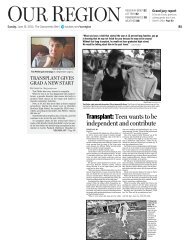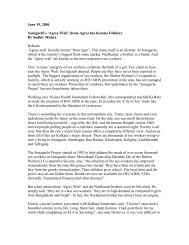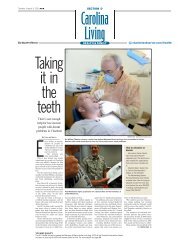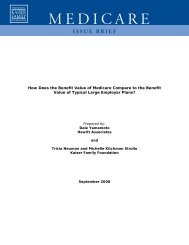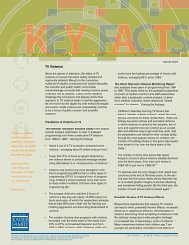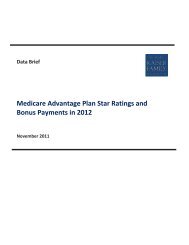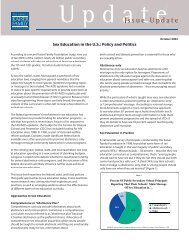HEALTH CARE COSTS: A PRimER - The Henry J. Kaiser Family ...
HEALTH CARE COSTS: A PRimER - The Henry J. Kaiser Family ...
HEALTH CARE COSTS: A PRimER - The Henry J. Kaiser Family ...
You also want an ePaper? Increase the reach of your titles
YUMPU automatically turns print PDFs into web optimized ePapers that Google loves.
Unnecessary spending in the US health care system. Some have estimated that 20%<br />
or more of total health care expenditures is due to various forms of waste, including<br />
overtreatment, failures of care coordination, failures of care delivery, administrative<br />
complexity, pricing failures and fraud and abuse. 30 Other studies found that from $600<br />
billion to $850 billion in waste could be cut annually from the U.S. health care system, and if<br />
waste reduction could be applied over the next 10 years, $3.6 trillion in wasteful spending<br />
could be saved, which is 10% of projected health care expenditures over the time period. 31<br />
Unnecessary or inappropriate treatments and tests are believed to contribute to the high<br />
level of health care costs, most recently addressed by the Choosing Wisely campaign,<br />
where nine physician groups (more anticipated in the future) have identified commonly used<br />
tests or procedures they say are often not necessary. 32<br />
Inefficiencies in medical care<br />
delivery and financing also contribute to health care costs. Wide variation in the use and<br />
cost of services across providers and in different geographic areas has called into question<br />
the appropriateness and value of the care received. <strong>The</strong> role of provider payment has also<br />
been cited as contributing to increased costs by, for example, encouraging the use of<br />
specialists or profitable equipment. <strong>The</strong> lack of integrated, efficient systems to electronically<br />
store and transmit health data is said to contribute to higher costs and limit the data<br />
available to study treatment effectiveness. 33<br />
Recent slow-down in health spending. <strong>The</strong> slower growth in health care spending in<br />
recent years is attributed to the downturn in the US economy in 2008 and 2009. As<br />
unemployment rose during the recession that lasted from December 2007 through June<br />
2009, people lost their jobs and often their health insurance as a result. Even those with<br />
insurance used fewer health care goods and services given financial uncertainties.<br />
Economic recessions have historically had a lagged impact on health care spending<br />
because insurance contracts typically lock-in premiums and benefits for a year, and when<br />
consumers lose their jobs, they may maintain their coverage through COBRA, a spouse’s<br />
policy, or a public program. But the slowdown in health spending from the most recent<br />
recession occurred sooner than in previous recessions because of, according to CMS, “the<br />
highest unemployment rate in 27 years, a substantial loss of private health insurance<br />
coverage, employers’ increased caution about hiring and investing during the recovery, and<br />
the lowest median inflation-adjusted household income since 1996.” 34 Others attribute a<br />
longer-term slowdown to the moderation of rapid growth following the backlash against<br />
managed care in the late 1990s and changes in benefit design to higher enrollee cost<br />
sharing. 35 As the economy improves, increases in health care spending may return to<br />
higher levels.<br />
26 THE HENRY J. KAISER FAMILY FOUNDATION



